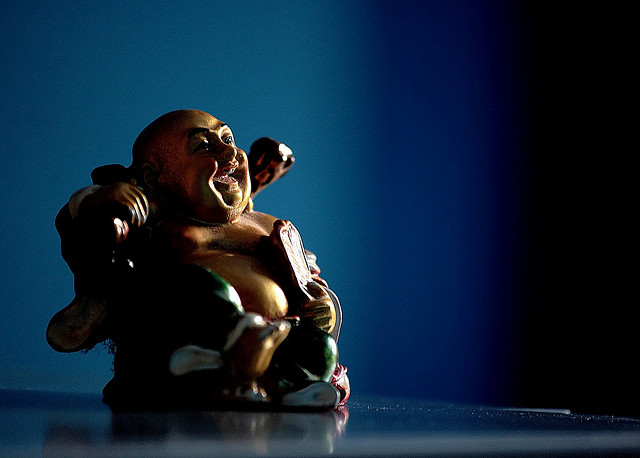In Buddhist philosophy, the only way to achieve lasting happiness is by following the Eightfold Noble Pathway.
In modern day science, happiness is characterised by a specific combination of chemicals, released in our brains, which make us feel good.
The question is—can the two concepts be blended to provide a new way of viewing happiness that is both scientific and philosophical?
According to science, pleasure is characterised by its transient nature; that is, as soon as the thing that is making us feel good is gone, so are the feelings. Because of this, pleasure tends to be brought on by short term “wins.” That crazy party you went to, the likes you got on your hilarious Facebook status update, your miraculous come from behind victory in table tennis—these are all moments of pleasure.
If you manage to string enough moments of pleasure together, particularly if they’re in a short period of time, it is easy to mistake the experiences for happiness. However, the two differ significantly.
While our happiness chemical (Oxytocin), doesn’t give us the same high as our pleasure chemicals (Dopamine and Serotonin), the satisfaction we feel lasts much longer.
A leading expert in the field of happiness is Professor Martin Seligman. In his 2004 TED Talk Prof Seligman is quoted as saying that,
“The difference between people that [sic] are extremely happy and those that [sic] are not, is not that they are more religious, in better shape, have more money, are better looking or experience more good events and fewer bad events. The one way in which they differ is that they are extremely social. Each is in a romantic relationship and each has a rich repertoire of friends.”
Prof Seligman goes on to describe what he calls our “three happy lives.”
The Pleasant Life: All about pleasure. This is the life of celebrity, the life that party animals chase, the life bound by the pursuit of Dopamine and Serotonin. The problem with this life is that it becomes a never-ending cycle of chasing short-term highs.
The Good Life: All about social engagement and experience. People who spend most of their time in this life tend to have a rich repertoire of friends and be in a long-term romantic relationship. They have also most often found a way to re-craft their lives to use their strengths more often. Commonly, it is by finding a job that fulfills their need for creativity, altruism and autonomy.
The Meaningful Life: The life characterized by purpose. It is meaningful in that it involves using their highest strength to help others. Altruism, Seligman believes, is the best way to increase your long-term happiness, as it gives you the greatest sense of purpose. The chemicals tend to agree with Seligman. Numerous studies have shown charitable acts cause a massive, long-lasting release of Oxytocin, far more than selfish “wins.”
But wait, here’s the kicker!
Seligman found that people who spend most of their time in meaningful life pursuits actually experience a boost of happiness when they visit the pleasant (pleasurable) life. People who spend most of their time in the pleasurable life, though, derive almost no lasting life satisfaction from their regular experiences of pleasure.
This may be why some of us struggle to find lasting happiness.
By spending too much time in the pleasant life, we push meaningful pursuits down our priorities list. When we get busy enough, we simply don’t have time for altruism, relationships and all of the things that contribute the greatest happiness to our lives.
Science meets Philosophy
Many concepts of the eightfold pathway echo the characteristics of Seligman’s Good Life and Meaningful Life.
Buddha believed in the renunciation of worldly possessions, the pursuit of charity and the importance of relationships. Combining right intentions with right actions and the right effort are three of the folds in the noble pathway. These three folds are important components in the meaningful life.
Thus, science and philosophy agree that the pursuit of meaning is the only true pathway to happiness.
Maybe it is time to rethink how we prioritize our lives and start to re-craft the way we view happiness.
By spending more of our time focusing on relationships and altruism, we can all start to experience a greater level of lasting happiness.
Relephant Read:
10 Things to Give Up in Exchange for Happiness.
Author: Garrick Transell
Editor: Emily Bartran
Photo: Simply CVR/Flickr
Facebook is in talks with major corporate media about pulling their content into FB, leaving other sites to wither or pay up if we want to connect with you, our readers. Want to stay connected before the curtain drops? Get our curated, quality newsletters below!












Read 0 comments and reply